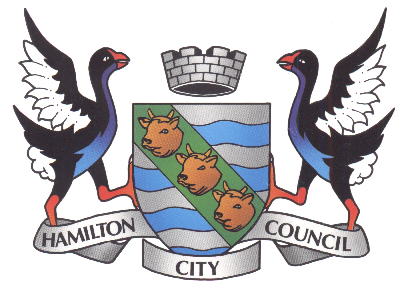Hamilton (New Zealand): Difference between revisions
Jump to navigation
Jump to search
Knorrepoes (talk | contribs) m (Text replace - "'''Origin/meaning :'''<br/> " to "====Origin/meaning====") |
Knorrepoes (talk | contribs) m (Text replace - "====Origin/meaning====The" to "====Origin/meaning==== The") |
||
| Line 12: | Line 12: | ||
[[File:hamilton.nz.jpg|center]] | [[File:hamilton.nz.jpg|center]] | ||
====Origin/meaning====The arms were adopted in 1946 in a competition launched by the council. | ====Origin/meaning==== | ||
The arms were adopted in 1946 in a competition launched by the council. | |||
The wavy bars in the shield represent the Waikato river that runs through the city. The bend with the oxen symbolises the green pastures and the role of the city as a centre of a large agricultural region. | The wavy bars in the shield represent the Waikato river that runs through the city. The bend with the oxen symbolises the green pastures and the role of the city as a centre of a large agricultural region. | ||
Revision as of 15:30, 20 November 2012
| Heraldry of the World Civic heraldry of New Zealand |
HAMILTON
Region: Waikato
Territorial Authority : Hamilton City
Origin/meaning
The arms were adopted in 1946 in a competition launched by the council.
The wavy bars in the shield represent the Waikato river that runs through the city. The bend with the oxen symbolises the green pastures and the role of the city as a centre of a large agricultural region.
The crown symbolises Hamilton's beginnings as a military post during the Maori War in the 19th century.
The supporters are two pukekos a common bird in the low lying country around the city.
Literature : Information obtained from the Hamilton City Council.

